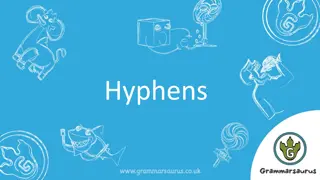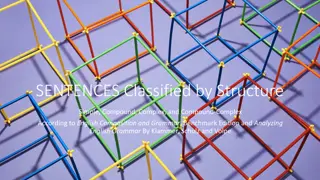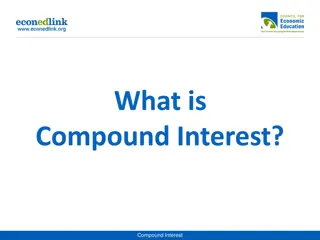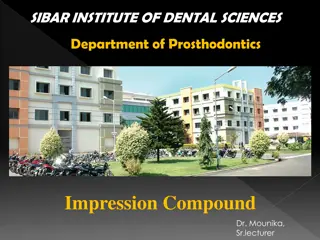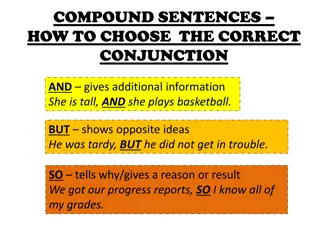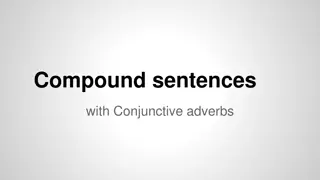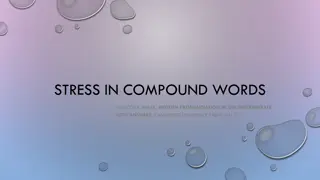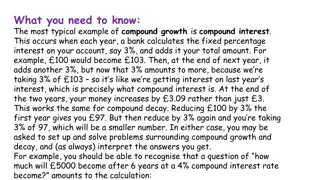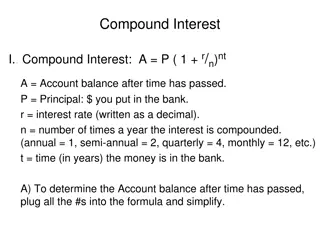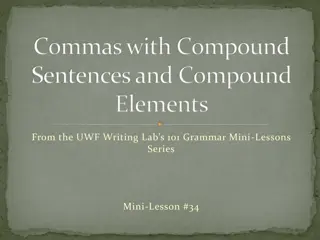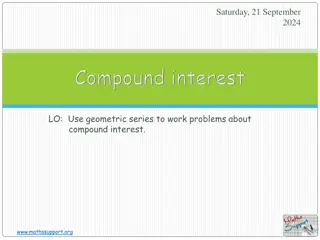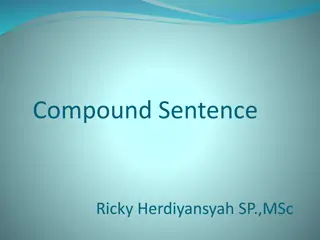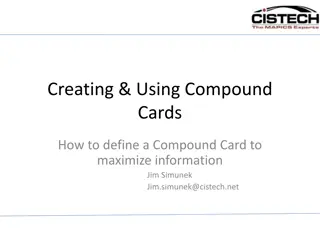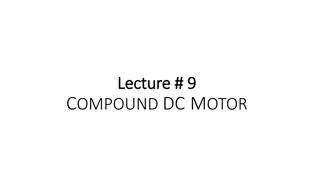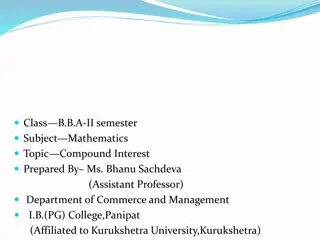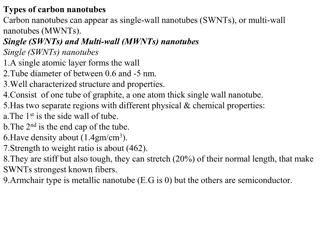X-ray Inspection Systems Market for Electronics & Semiconductors_Blog
The global X-ray Inspection Systems Market for Electronics & Semiconductors is poised for significant growth, projected to hit a value of $772.8 million by 2029, exhibiting a robust Compound Annual Growth Rate (CAGR) of 11% during the forecast period from 2022 to 2029. This surge in market value is
0 views • 2 slides
Factors That Help You Select The Most Appropriate Purging Compound Supplier
Are you running a plastic manufacturing & processing unit? It is crucial to utilize a high-quality Purging Compound to ensure efficiency and cleanliness in your production machines & equipment.\n\nFor more info visit: \/\/ \/purging-compound\/
1 views • 6 slides
Mastering the Use of Hyphens in Compound Adjectives
Hyphens play a vital role in creating compound adjectives by joining words together to form longer descriptive phrases. This guide provides tips on identifying, using, and creating compound adjectives with hyphens to enhance your writing skills. Discover the importance of hyphens in maintaining clar
0 views • 8 slides
Sentence Structures: Simple, Compound, Complex, and Compound-Complex
Learn about the different types of sentence structures - simple, compound, complex, and compound-complex - through examples and definitions. Understand the components of clauses and sentences, including independent and dependent clauses, to enhance your understanding of English grammar.
2 views • 11 slides
Understanding Light Perception in Insects
Insects perceive light through various receptors such as compound eyes, ocelli, and stemmata. Compound eyes, made up of ommatidia, play a key role in capturing light stimuli ranging from UV to red wavelengths. Different types of compound eyes, like dioptric and holoptic, form images differently for
3 views • 12 slides
Recrystallization for Solid Organic Compound Purification
Recrystallization is a laboratory technique used to purify solids based on their different solubilities. It involves dissolving an impure solid in a suitable solvent, cooling the solution to allow pure crystals to form, filtering to isolate the purified solid, and drying it. Finding a good recrystal
1 views • 11 slides
Understanding Compound Interest and Simple Interest Formulas
Interest rates play a crucial role in financial transactions. Compound interest is earned on both the principal and accumulated interest, while simple interest is earned solely on the principal amount. Different compounding frequencies affect the overall interest earned. Learn how to calculate simpl
1 views • 14 slides
Overview of Semiconductor Materials and Applications
Understanding electronic transport in semiconductors is essential for various applications such as computers, smartphones, LEDs, and more. Semiconductors like silicon and compound semiconductors play a crucial role in creating devices with unique properties. By delving into the world of semiconducti
0 views • 20 slides
Understanding Impression Compound in Dentistry
Impression compound is a key material in dentistry used for making negative reproductions of teeth and surrounding structures. It plays a crucial role in the fabrication of dentures, crowns, bridges, and orthodontic appliances. The accuracy of the impression directly impacts the fit and functionalit
3 views • 17 slides
Understanding Compound Interest in Class VIII Mathematics
In this chapter, students will learn about simple interest and compound interest, memorize their formulas, derive compound interest formula from simple interest concept, calculate compound interest with different compounding frequencies, understand growth and depreciation concepts, and derive formul
1 views • 29 slides
Understanding Temperature Effects on Donor and Acceptor Ionization in Semiconductors
Temperature plays a crucial role in the ionization of donor and acceptor atoms in semiconductors. In N-type semiconductors, the Fermi level lies below the conduction band, while in P-type semiconductors it lies above the valence band, with the position depending on temperature and impurity atoms. Do
1 views • 13 slides
Understanding the Impact of Temperature on Fermi Level in Semiconductors
The Fermi level plays a crucial role in determining the behavior of electrons in semiconductors at different temperatures. As temperature increases, the Fermi level shifts, affecting the generation of free electrons and holes in the valence and conduction bands. In intrinsic semiconductors, electron
2 views • 53 slides
Understanding Nuclear Reactions: A Comprehensive Overview
Nuclear reactions involve direct and compound scenarios, with direct reactions occurring in a short period and compound nucleus reactions leading to long-lived excited states. Different types of reactions like elastic scattering, break-up, and compound nuclear reactions are discussed, highlighting t
5 views • 11 slides
Understanding the Time Value of Money: Simple vs Compound Interest
Explore the importance of time in financial decisions, the difference between simple and compound interest, and how it affects the future value of your investments. Learn about the formulas for simple interest, examples of its application, and the significance of compound interest for maximizing ret
1 views • 60 slides
Understanding Compound Words and Phrases in Morphology & Syntax
Exploring the differences between compound words and phrasal words in linguistics, this content delves into how roots combine to form compounds and how phrasal words function syntactically. Through examples like "green house" versus "greenhouse," as well as stress and semantic criteria, the distinct
1 views • 51 slides
Mastering Simple and Compound Sentences: Rules and Examples
Explore the world of simple and compound sentences through detailed explanations, examples, and rules. Learn how to identify, structure, and transform sentences from compound to simple form. Enhance your understanding of sentence construction and improve your writing skills.
0 views • 17 slides
Mastering Compound Sentences: Choosing the Correct Conjunctions
In compound sentences, choosing the correct conjunction (AND, BUT, SO) is essential to convey the intended relationship between ideas. This task involves matching sentence endings to conjunctions, understanding how each conjunction functions in forming connections between clauses. Through examples a
0 views • 8 slides
Understanding Sentence Structure: Phrases, Clauses, and Compound Sentences
Learn about phrases, clauses, simple sentences, conjunctions, and compound sentences in English grammar. Understand the differences between independent and dependent clauses, how to form compound sentences using conjunctions, and practice writing sentences about Justin Bieber. Explore the components
1 views • 21 slides
A Guide to Using Conjunctive Adverbs in Compound Sentences
A conjunctive adverb is an adverb used to connect clauses or parts of a sentence. When joining compound sentences with conjunctive adverbs, use a semicolon and a comma. Examples and guidelines are provided for proper usage. Practice formulating compound sentences with conjunctive adverbs to enhance
0 views • 7 slides
Understanding Stress in Compound Words for English Pronunciation
Explore the rules of stress placement in compound words in English pronunciation. Learn how stress can shift based on word combinations and types. Discover the differences in pronunciation between compound words, adjectives, nouns, and verbs for accurate spoken English.
0 views • 4 slides
Understanding PN Junction in Semiconductors
Mobility in semiconductors is affected by scattering events as temperature increases, with impurity scattering dominating at low temperatures and lattice scattering at high temperatures. A p-n junction is the interface between p-type and n-type semiconductor materials, with excess holes on the p-sid
0 views • 15 slides
Understanding Conductivity and Current in Extrinsic Semiconductors
This content delves into the intricacies of conductivity in extrinsic semiconductors, exploring the behavior of carriers in n-type and p-type materials. It covers topics such as drift current density, diffusion current density, the Einstein relation, recombination, and the Hall effect. Practical exa
0 views • 8 slides
Understanding Band Population in Semiconductors
Exploring the concepts of electron and hole population in semiconductor bands through the Fermi-Dirac function, density of states, and Fermi energy. Learn how the Fermi function influences carrier concentration, the difference between metals and semiconductors in band structure, and the behavior of
0 views • 14 slides
Understanding Extrinsic Semiconductors: Fermi Level and Doping Effects
Extrinsic semiconductors play a crucial role in modern electronics by allowing controlled addition of impurities to tailor conductivity. The Fermi level in extrinsic semiconductors shifts based on the number of electrons and holes in the conduction and valence bands, influencing conductivity. Doping
0 views • 14 slides
Understanding Semiconductors: Types, Properties, and Differences
Semiconductors bridge the gap between insulators and conductors, exhibiting varying levels of electrical conductivity based on temperature. This tutorial covers intrinsic semiconductors, differences between silicon and germanium, and the essential properties of semiconductors. Learn about the roles
0 views • 25 slides
Understanding Semiconductors: Intrinsic and Extrinsic Types
Semiconductors play a crucial role in electronic devices, with materials falling into three categories based on electric conductivity: Conductors, Insulators, and Semiconductors. Intrinsic semiconductors are chemically pure, while extrinsic semiconductors have impurities added to enhance their condu
0 views • 39 slides
Understanding Compound Subjects in Grammar
Compound subjects joined by "and" usually require plural verbs, while compound subjects joined by "or," "nor," "either or," or "neither nor" may be singular or plural depending on the subject closest to the verb. Recognizing when to use singular or plural verbs with compound subjects is essential fo
0 views • 5 slides
Understanding Compound Growth and Decay Through Examples
Compound growth and decay, specifically compound interest, involve calculating interest on a changing total amount over time. This concept is illustrated through various examples and equations, showcasing how investments or values increase or decrease with each period. Learn how to solve problems re
0 views • 9 slides
Understanding Compound Interest Formulas and Examples
Compound interest is a powerful concept in finance that calculates the growth of an investment over time. This summary explains the formula for compound interest, how to calculate account balances and interest earned, and examples for various scenarios. You'll also learn how to solve for the princip
0 views • 7 slides
Mastering Commas in Compound Sentences
Learn how to effectively use commas in compound sentences and compound elements. Discover when to include commas before coordinating conjunctions that separate complete sentences and when it's appropriate to leave them out for short sentences. Understand when not to use commas when coordinating conj
0 views • 4 slides
Understanding Compound Interest: A Practical Guide
Compound interest is a powerful financial concept that can significantly impact your savings and investments. This guide explains how compound interest works using geometric series and provides a step-by-step solution to a compound interest problem. Learn about the types of interest, the difference
0 views • 26 slides
Understanding Compound Inequalities: Solve, Graph, and Interpret
Explore compound inequalities, learn to solve them step by step, graph the solutions, and grasp the concepts of "and" and "or" in the context of mathematics. Practice solving and graphing various compound inequalities for a clearer understanding of how they work.
0 views • 26 slides
Understanding Compound Sentences: Examples and Usage
A compound sentence is a group of words containing a subject and a predicate, expressing a complete idea. It can be brief or extended with qualifiers. Independent clauses are combined with coordinating conjunctions like "and," "but," or "or" to form compound sentences. Semicolons and transitional ex
0 views • 8 slides
Understanding Compound Cards for Maximum Information Utilization
Compound cards offer a versatile way to present and manage information in a structured manner. They are akin to workbenches but in a compact card format, allowing for efficient display of details across 2 to 4 sections. Learn how to define, create, and utilize compound cards effectively to enhance i
0 views • 31 slides
Comparison of Compound DC Motors and Their Characteristics
Compound DC motors, including cumulative, differential, and compound configurations, offer unique operational features based on how the series and shunt field windings are connected. Cumulative compound motors provide improved torque characteristics but lower speed, while differential compound motor
0 views • 12 slides
Understanding Compound Interest in Mathematics
This detailed content explains the concept of compound interest in mathematics, covering key terms like moneylender, borrower, principal, rate, and amount. It also delves into simple interest, types of interest, and provides formulas for calculating compound interest based on different scenarios. Pr
0 views • 12 slides
Understanding Repeated Percentage Changes in Sales and Investments
This content covers examples and calculations related to repeated percentage changes in sales and compound interest investments. It explains how prices are affected when all items are reduced by a certain percentage in sales, as well as scenarios involving compound interest investments over multiple
0 views • 17 slides
Grammar on the Go! Unit 5 Lesson 7 Sentence Corrections & Clauses
This content focuses on sentence corrections in red, defining vocabulary words, and understanding different types of sentences such as compound, complex, simple, and compound/complex. It also covers identifying sentence types like declarative, imperative, interrogative, and exclamatory. Additionally
0 views • 9 slides
Energy Level Formation in Semiconductor Materials
Energy levels in isolated atomic structures form discrete levels which expand to bands in insulators, semiconductors, and conductors. Extrinsic materials like n-type and p-type are created by doping semiconductors with impurity atoms to alter conductivity. The n-type material involves adding pentava
0 views • 4 slides
Understanding Different Types of Carbon Nanotubes
Carbon nanotubes come in single-wall (SWNTs) and multi-wall (MWNTs) forms, each with unique characteristics. SWNTs have a single atomic layer forming the wall, while MWNTs consist of concentric tubes. SWNTs are stronger and mostly semiconductors, while MWNTs are less strong and can also be semicondu
0 views • 10 slides

